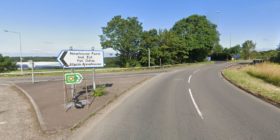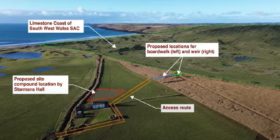Proposed Ban on Dogs in Play Areas and Sports Pitches in Monmouthshire From June

A BAN on dogs in children’s play areas and sports pitches could come into force from June this year.
Dog walkers will also be required to carry a bag to pick up their pooch’s poo, and restrictions planned for Monmouthshire will also include areas where the animals must be kept on a lead.
Failure to comply would be a criminal offence and anyone convicted by a court could be fined up to £1,000 but fixed penalty notices – of £100 to be paid within 14 days – will be offered as an alternative, with that reduced to £75 for those able to pay within 10 days.
Monmouthshire County Council consulted on the proposed Public Spaces Protection Order, or PSPO, for dog controls in October and November last year and received 517 completed questionnaires with 481 responses (93 per cent) from residents and 331 (62 per cent) completed by dog owners.
People walking dogs will be required to pick up their dog’s poo on any public land as it present there is only a duty to do so in Monmouthshire in designated areas.
They will also have to show they have a bag if requested by an authorised officer.
It is planned to ban dogs from 180 places marked as exclusion areas which include children’s play parks, sports pitches and grounds of leisure centres and schools with a further 20 areas including cemeteries and castle grounds where dogs will have to be kept on a lead.
There will also be the power for council officers to order a person in charge of a dog to put a lead on the mutt if it is considered to be out of control or causing alarm or distress or to prevent a nuisance in a public space.
The council’s consultation found 479 people (93 per cent) supported requiring dog walkers to clean up after their animals and 456, or 88 per cent, backed the requirement to carry a bag to scoop the pooch’s poo.
There was also majority support for banning dogs from areas such as playgrounds and school fields with 330, or 64 per cent, of respondents backing the plans and 374 (72 per cent) supported creating ‘dogs on lead areas’ while 440 (85 per cent) agreed with a the ‘dog on lead by direction’ order.
As well as the public the council consulted the police and major landowners including housing associations, the Bannau Brycheiniog National Park and the National Trust and dog and animal welfare groups.
The Dogs Trust questioned whether a requirement to carry bags would be enforceable and the Kennel Club fears owners could be penalised unfairly if approached at the end of their walk having used all their bags.
Huw Owen, the council’s principal environmental health officer, said in a report for the cabinet: “These concerns are understood, but it is hoped that the provision in particular will enable ‘intel’ led enforcement for officers to approach dog walkers where concern has been raised that they routinely do not pick up.”
The Dogs Trust, Kennel Club and RSPCA haven’t objected to exclusion areas “providing there was a specific and reasonable justification for a designation” and similar to ‘dogs on lead areas’ believe they should be kept to a minimum.
Mr Owen said the “RSPCA in particular encouraged a more flexible approach to allowing dogs on council owned marked sports pitches” and argued the requirement to pick up a dog’s poo addresses concerns about dog’s on sports pitches.
The council’s Labour-led cabinet will be asked to approve making the orders, which will last for three years and come into force from June 1 this year, when it meets at 5pm on Wednesday, April 3.
Signs to inform people of the restrictions will cost an estimated £37,000 of which the council says around £7,000 could be paid for from other landowners including town and community councils.
The dog exclusion orders wouldn’t apply to guide and assistance dogs.
Spotted something? Got a story? Email News@News.Wales









